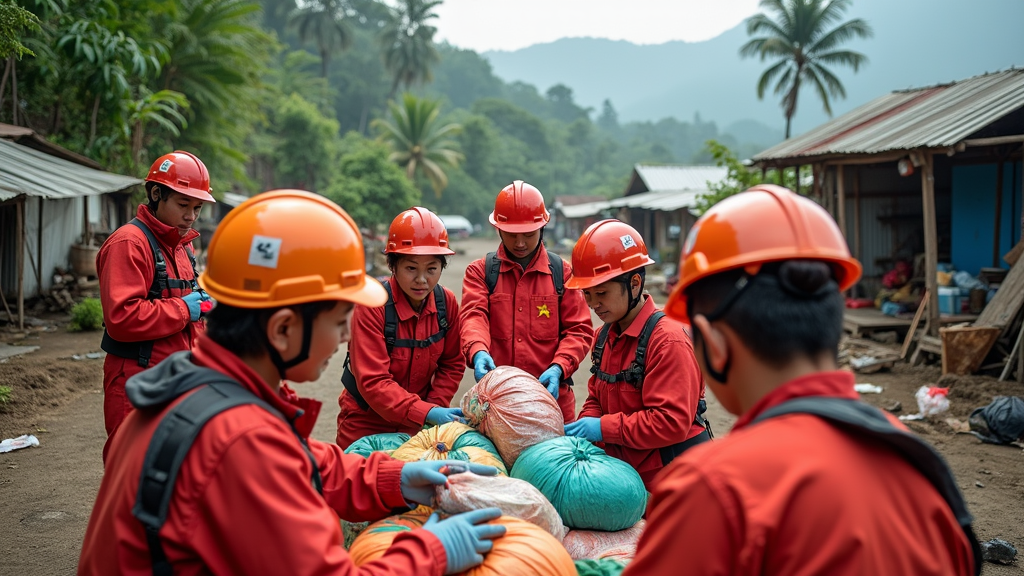New World Development’s Financial Challenges in Hong Kong
New World Development: The Financial Labyrinth
Ladies and gentlemen, as we stand at the crossroads of change in the bustling streets of Hong Kong, one name reverberates through the financial institutions and real estate markets—New World Development. This property giant is currently entangled in a financial challenge that has sent ripples through some of Hong Kong’s most influential banks, drawing them into a complex web of loan refinancing. As New World Development pushes to refinance approximately HK$87.5 billion (around US$11.2-14.4 billion) in loans maturing by the end of June 2025, we must explore the depths of this unfolding saga, not only for what it signifies for New World itself but for the broader implications it carries for Hong Kong’s economic landscape.
Background and Context
New World Development finds itself at a pivotal moment where financial pressures loom large, marked by daunting coupon payments and a staggering total liability load reported at HK$210.9 billion as of December 2024. This urgency for refinancing is exacerbated by the impending expiration of a covenant waiver on their existing loans—a ticking time bomb that could prompt banks to demand immediate repayment if a new agreement is not secured. That which is at stake is not merely survival but the integrity of a labyrinthine economy entwined with the fortunes of its key players. The initial deadline for banks to secure refinancing commitments has already been a moving target, now stretching close to the nearing deadline of June, accentuating the vulnerability of New World amid a world that often prioritizes short-term visibility over long-term sustainability.
Significance of the Refinancing Effort
This refinancing endeavor stands as one of the largest attempts ever orchestrated by a company in Hong Kong, a fact that places New World Development under the spotlight of scrutiny. A successful outcome offers a glimmer of hope, alleviating liquidity fears and bringing reprieve to a company perpetually shadowed by uncertainties. Conversely, failure to strike a deal may spell catastrophe for not only New World and its stakeholders but also the bondholders, many of whom are facing harrowing repayment risks, particularly when multiple bond coupon payments are set to come due in the very same month. What does this reality say about the interconnected nature of modern economies, ladies and gentlemen, where the fate of one institution can reverberate across the entire financial sector?
Banks Involved and Their Exposure
In this high-stakes game, the players are equally monumental, with leading banks like HSBC and Bank of China holding the cards tightly. These banks carry substantial exposure to the local property sector, their commercial real estate loans amounting to over $33 billion on HSBC’s books by the end of 2024. A startling statistic has emerged, revealing that approximately $3.2 billion of these loans are classified as credit impaired—a staggering increase that signals distress under the surface of seemingly stable waters. As relationships deepen between these banking titans and property developers, the ties that bind them grow increasingly intricate, revealing familial connections such as Sonia Cheng, who serves as an independent non-executive director on HSBC’s board, further blurring the lines of corporate governance.
Market Conditions and Outlook
The race against time for refinancing takes place against a backdrop of evolving market conditions. The property landscape of Hong Kong shows signs of easing, with the one-month interbank rate recently dipping below 1% for the first time in three years. This development offers a faint glimmer of optimism—potentially lowering borrowing costs and enhancing New World’s chances of successful refinancing. Yet, in the world of finance, optimism is a thread woven through uncertainty. The potential threat of default looms over this behemoth of a property developer, a scenario that would undoubtedly rattle investors, shatter confidence, and further strain an already beleaguered banking sector.
Additional Financial Maneuvers by New World
But New World’s strategy extends beyond mere refinancing of existing loans; they are anticipating broader horizons, seeking to accumulate further funding through an additional loan of up to HK$15.6 billion, using their famed Victoria Dockside property as first-ranking mortgage collateral. This move underscores a desperate need to bolster liquidity amidst an atmosphere thick with financial pressures, drawing attention not only to the urgency of their situation but also to the often ruthless logic of the market, where every asset is evaluated in terms of its potential to raise capital in times of need.
Broader Implications
The narrative surrounding New World Development is emblematic of the cries echoing throughout the wider property market in Hong Kong, a sector well-acquainted with the specter of financial hardship. The implications of the ongoing refinancing saga extend far beyond the balance sheets of a single developer; they resonate through the banking institutions that were once bulwarks against systemic failure. Distressed property sales are becoming increasingly common, as credit impairments creep across loan portfolios, showing that the stratified world of finance is growing more fragile by the day. In an interconnected system, the ripple effects of New World’s situation may well become tidal waves that threaten to drown not just developers and banks but the very fabric of the Hong Kong economy itself.
As we watch these events unfold, we are reminded that the road to financial stability is often paved with challenges that test our collective resolve. In a landscape fraught with both peril and opportunity, we must stay vigilant and mindful of the storm clouds brewing just beyond the horizon. Meanwhile, for those eager to stay updated on the latest developments, this link leads you to Завжди свіжі новини.
In a world where the markets are swayed by forces beyond our control, we are left to ponder the ultimate fate of New World Development and, by extension, the economic heart of Hong Kong.
The Growing Importance of Regulatory Oversight
In this delicate dance of refinancing, the role of regulatory oversight cannot be understated. As Hong Kong’s financial authorities observe this unfolding drama, they find themselves at a crossroads of intervention and laissez-faire economics. With the property market showing signs of distress, regulators are grappling with the need to strike a balance between enabling growth and preventing systemic collapse. The implications of New World Development’s maneuverings underscore a broader lesson: in an interdependent economic system, precautionary measures and policy readiness must evolve in tandem with market dynamics.
Impact on Investor Sentiment
As the refinancing saga unfolds, investor sentiment is becoming increasingly complex and nuanced. The stakes for New World and its significant bondholders raise red flags, injecting uncertainty into markets that thrive on confidence. In the eyes of investors, a successful refinancing deal could restore faith, leading to an uptick in property values and a resurgence of activity in the sector; conversely, the failure to secure necessary funds would trigger a wave of panic, casting shadows over the already beleaguered property market. This dichotomy of hope and despair illustrates the fragility of human emotion in the realm of finance, where perceptions often dictate market realities.
A Wider Economic Perspective
The unfolding events surrounding New World Development reflect something deeper—the interconnectedness of the Hong Kong economy, where volatility can send shockwaves across various sectors. The crisis illustrates a moment of reckoning for long-reliable institutions, compelling us to consider how many more entities may be teetering on the brink. The responses from banks, investors, and regulators remind us that in an era defined by rapid financial change, vulnerability often lies waiting just beneath the surface.
Lessons Learned and Future Considerations
This complex web of refinancing negotiations serves as a crucible of lessons for corporations, banks, and regulators alike. The case highlights the importance of transparency, strategic foresight, and the need for robust risk management practices in an environment where quick pivots can mean the difference between survival and failure. With systemic risks on the table, the future must not only prioritize profit margins but also the health of the entire financial ecosystem.
The Road Ahead
As we contemplate the road ahead for New World Development, one thing becomes clear: the outcome will extend far beyond the balance sheets of a singular enterprise. Whether as a wake-up call or a cautionary tale, this saga will likely illuminate the vulnerabilities inherent in the broader property and financial sectors of Hong Kong. The results of these refinancing efforts will set the tone for future corporate strategies amid economic unpredictability, shaping an era in which agility and resilience must take precedence.
A Final Reflection on Financial Resilience
As we navigate the complexities of New World Development’s pivotal moment, we are left with much to ponder. The intertwining fates of developers, banks, and investors beckon us to reflect on the lessons learned from this unfolding drama. As fate plays out over the coming months, we must remain cognizant of the broader consequences that ripple through an interconnected world—where every decision counts, and every outcome bears weight. Financial resilience is not merely about weathering the storm; it’s about understanding the currents that can either lead us to safety or draw us into the depths of uncertainty.
Stay informed and updated on this developing story by visiting Завжди свіжі новини. For more insights into the ongoing dynamics of financial institutions, you may find detailed perspectives in this piece.
latest video
news via inbox
Subscribe to the latest news in the world of politics and technology







